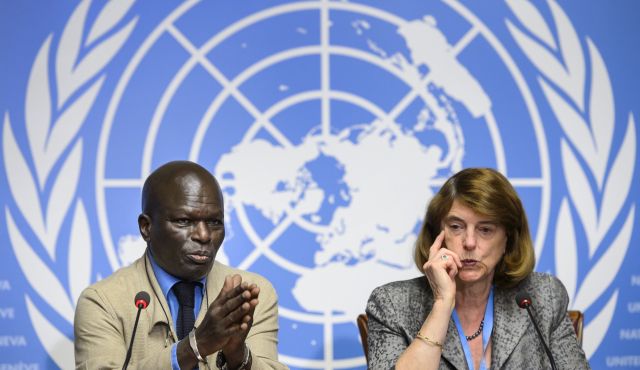UPDATES
Multiple expert reports contradict UN’s findings in Gaza conflict
June 29, 2015 | Miriam Smallman

The United Nations Office of the High Commissioner for Human Rights (OHCHR) has released the results of its official inquiry into the 2014 Israel-Gaza conflict. The Commission of Inquiry, chaired by Mary McGowan Davis and Doudou Diène, appears to have come to a superficially balanced conclusion: that both Israel and ‘Palestinian armed groups’ may have committed war crimes.
A full list of documents published by the UN can be found here, and includes the full 183-page detailed report, a briefer 34-page summary, and a question-and-answer document concerning the Commission’s conclusions.
There are several resources that readers can turn to for a more comprehensive assessment of the conflict, and that fill in several important gaps that the UN report appears to skim over.
- One publication, a collaboration between NGO Monitor and UN Watch that was written prior to the release of the report, has sought to address four primary dimensions of the conflict that, in light of previous UN inquiries into Israel, it expected to be omitted from this report: the production and import of weapons into Gaza in violation of international law; the mechanisms by which Hamas, largely recognised as a terrorist organisation, was financed (it should be noted, by other UN member states); evidence documenting the misuse and diversion of humanitarian aid to Gaza; and the credibility of assertions by NGOs that have been referenced in previous UN reports.
- A second piece, written by Hillel Neuer, executive director of UN Watch, is a thorough analysis of how the OHCHR works, its relationship to the UN Human Rights Council, and why the McGowan Davis Report was structured from the start to bear similar findings to the Goldstone Report.
- A third resource, one that should be read side-by-side with the UN report, is Israel’s own investigation into the conflict (which can be found here.) The Israeli report explains the factual and legal aspects of the incursion and provides the Israeli perspective.
- The Israeli report is consistent with a fourth -and completely separate- inquiry into the conflict from a multinational group of senior military and political experts that visited Israel in May (the High Level Military Group). While the UN Commission that accused Israel of war crimes lacked high-level expertise in military law, this group determined, in a written letter to the UN and upcoming report, that Israel went to great lengths (sometimes to its own detriment) to adhere to international military law. (AIJAC previously commented on this group’s findings here.)
- Furthermore, a fifth resource: a task force of five high-ranking American military experts has produced a report on the conflict commissioned by the Jewish Institute for National Security Affairs (JINSA). Like the High Level Military Group, the JINSA task force also found that Israel abided by international laws of armed conflict.
- Sixth, Richard Kemp, a British military expert and member of the High Level Military Group that visited Israel in May, has published an op-ed in the New York Times arguing why the lack of military expertise on the UNHCR Commission makes the report so dangerous.
- A seventh resource comes from the Lawfare Blog, a partner project of the Brookings Institution. Benjamin Wittes and Yishai Schwartz thoroughly explain the predilection of the UNHCR commission to jump to false conclusions in the absence of verifiable information, and why that fatally hinders the credibility of the report.
Now that the report has been released, the Commission will present its findings to the UN Human Rights Council in Geneva in a meeting scheduled for today. In its Questions and Answers document, the Commission writes that it “hopes that parties will seriously study the findings of the report and implement its recommendations,” and, given the UN’s enthusiasm for passing resolutions disproportionately against Israel, it likely will. But while the UN may be content to comment on the conflict through its own set of blinkers, there remains an abundance of evidence to suggest a much different reality.
Miriam Smallman
Tags: Israel





